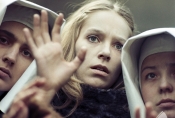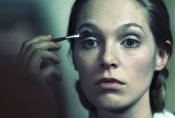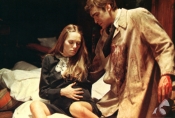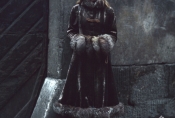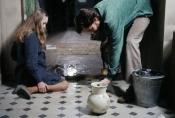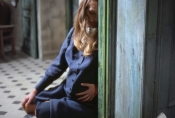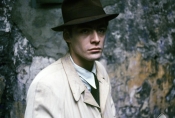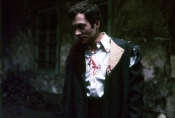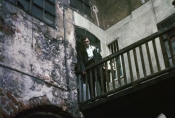THIRD PART OF THE NIGHT [1971]
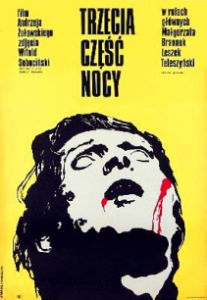
year:
- 1971
release date:
- 4 I 1972
runtime:
- 101 min
directed by:
- Andrzej Żuławski
written by:
- Mirosław Żuławski, Andrzej Żuławski
director of photography:
- Witold Sobociński
cast:
- Małgorzata Braunek [Helena, wife of Michał - Marta], Leszek Teleszyński [Michał], Jan Nowicki [Jan, Helena’s first husband], Jerzy Goliński [Michał’s first husband], Anna Milewska [sister Klara, a nun], Michał Grudziński [Marian,a lice feeder], Marek Walczewski [Rozenkranc], Hanna Stankówna [a lice feeder], Alicja Jachiewicz [a waitress], Leszek Długosz [a blind man, leader of the organisation], Jadwiga Halina Gallowa [Rozenkranc’s mother], Halina Czengery [Michał’s mother], Grażyna Barszczewska [a laboratory worker in the Weigl Institute], Ewa Ciepiela [a lice feeder], Tadeusz Huk [a lice feeder]
edited by:
- Halina Prugar
music by:
- Andrzej Korzyński
production design:
- Teresa Barska
produced by:
- Zespół Filmowy „Wektor”
executive producer:
- Barbara Pec-Ślesicka
awards:
-
• Andrzej Munk Award 1971 for Andrzej Żuławski
• IFF Adelaide (Australia) 1972: Diploma of Recognition
• 1st International Meeting of Cinema "Youth on the Screen" Koszalin 1973: Jantar
About the film
A war drama. An innovative perspective on the occupation, which becomes the backdrop for reflections on total danger and universal moral dilemmas: love, fidelity, and courage.
The beginning of the Nazi occupation. In a country house, Michał is recovering from typhoid. With him are his parents, his wife Helena, and son his young son Łukasz. One morning, the men and the boy go to the forest. Łukasz is separated from them and returns home. Meanwhile, the house is occupied by unidentified troopers who murder the two women and the boy. Michał and his father move to the town where the main hero joins the underground resistance. During one of the actions, he is shot and escapes from the Germans, hiding in a stairwell of a building. A similarly dressed man happens to be there, whom the Nazis mistake for Michał, and they wound and arrest him. Michał secretly sees Marta, the pregnant wife of the victim, very similar to the late Helena.
After the departure of the Germans, the woman goes into labour and asks the hero for help. Michał delivers the baby and, exhausted, loses consciousness. When he recovers, the mother and the newborn are no longer there. He begins to search for her, which angers his father, who accuses him of irresponsibility in relations with others − women in particular. He chastises him for breaking Helena’s first marriage to Jan. Son and father separate in anger. Michał finds the woman at the shelter run by Klara, a nun, his own sister. By a strange coincidence, the mother and child occupy the same room in which the hero once lived with his wife and Łukasz. It seems to Michał that his life begins to repeat − Marta is a mirror image of his deceased wife. Driven by guilt, he begins to care for the woman and her child. In order to support them, he returns to his previous dangerous job. He becomes a lice feeder at the Weigl Institute. He learns that Marta’s husband is in a hospital under guard. He obtains the consent of Ślepy, his commander, to liberate the prisoner. He tells Marta that her husband will be released. At this point, they both realise how much they love each other. Shortly after, the Germans liquidate the shelter and kill sister Klara. Michał visits his father to pick up the gun, and informs him of her death.
While the father sets fire to the family flat and commits suicide, the Germans arrest Ślepy’s unit. Michał, tipped off by a laboratory worker from the Weigl Institute, is not arrested. He tries to free Marta’s husband on his own. When he gets to the hospital with a fake pass, he sees with horror that Marta’s father has the face of Jan, Helena’s first husband. Discovered by the guards, he escapes through the basement corridor. He runs into a gurney with a corpse bearing his own face. His entire recent past flashes before his eyes: the bodies of the murdered loved ones, the country house and the mysterious riders.
Jan Słodowski, Leksykon polskich filmów fabularnych, Warszawa 1996
Articles
-
War beading up into a red dot
Monika Maszewska-Łupiniak
„Kwartalnik Filmowy” – Special Issue 2013: “Polish Film Scholars on Polish Cinema”
